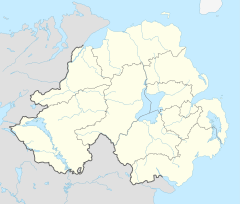Derrygonnelly
| Derrygonnelly | |
|---|---|
 Derrygonnelly Catholic church |
|
| Derrygonnelly shown within Northern Ireland | |
| Population | 594 (2001 Census) |
| Irish grid reference | H1215 |
| District | |
| County | |
| Country | Northern Ireland |
| Sovereign state | United Kingdom |
| Postcode district | BT93 |
| Dialling code | 028 |
| EU Parliament | Northern Ireland |
| UK Parliament | |
| NI Assembly | |
Derrygonnelly (from Irish: Doire Ó gConaíle, meaning "O'Connelly's oak grove") is a small village and townland in County Fermanagh, Northern Ireland. Near Lower Lough Erne, the village was home to 594 people (at the 2001 Census) and dates to the Plantation era. It is situated within Fermanagh and Omagh district.
The village has a long history of Irish traditional music and each year in early October there is a celebration of local talent in memory of musicians Eddie Duffy and Mick Hoy. Musicians come from all over Ireland and from further afield to enjoy this festival which bases itself in any of Derrygonnelly's four pubs.
Ulsterbus route 59 provides several journeys a day to/from Enniskillen via Monea and The Graan. There is no Sunday service.
Derrygonnelly was founded by General Archdale as a Plantation town. The area hosted fairs from the late 18th century but the village itself only really developed as late as 1812 when the long, flat main street was built along the Sillees River. The main road to Enniskillen was known as the Famine Road as it was made during the 1846 famine as a relief scheme.
The townland of Derrygonnelly contains two Scheduled Historic Monuments: Dunbar manor plantation castle, grid ref: H11871 52475 and a 17th-century church, grid ref: H1208 5240.
The old creamery in Derrygonnelly has been converted into a residential environmental education centre, Tir Navar, run by the Field Studies Council.
...
Wikipedia

